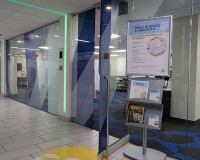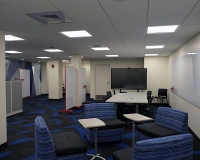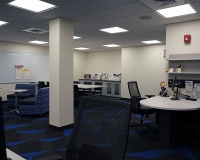Small Business and Nonprofit Workspace
Toledo Lucas County Public Library
Innovation Synopsis
The Toledo Lucas County Public Library launched the Small Business and Nonprofit (SBN) Workspace in June of 2024 to meet the growing need for a physical space for entrepreneurial support both in the library and in the Greater Toledo Area. In the two years prior, the SBN department increased customer interactions from 1,900 people in 2022 to 3,300 in 2023.
In this space, business specialist librarians offer classes, guided assistance, and one-to-one technical assistance sessions to members of the public who are in the process of starting a business or are attempting to improve or scale their business. Examples of services include business plan or marketing plan assistance, finding access to funding, business formation guidance, industry and competitive research, or referrals to other providers in the local business ecosystem.
In addition to services offered by internal staff, the space is open to other local business technical service providers to offer consultations and classes.
Challenge/Opportunity
In 2023, the Small Business and Nonprofit Department performed asset mapping of business technical service providers in the Greater Toledo business ecosystem. This asset mapping looked at each partner’s areas of expertise as well as potential service gaps. It was determined that the ecosystem as a whole lacked an accessible physical space for entrepreneurs with supportive technology. Staff felt the library was uniquely positioned to meet this need coupled with staff time and expertise.
At the same time, the SBN Department performed an internal evaluation on its own service gaps. It was determined that because the department’s services were largely appointment-based, some customers experienced barriers approaching staff in this manner. Staff also felt that this led to a potential loss of customer interaction for shorter reference questions or those who felt their questions did not require an appointment.
These gaps lead to the proposal to develop the Workspace.
Key Elements of Innovation
Flexibility was a core tenant in developing the Small Business and Nonprofit Workspace. The space utilizes mobile furniture to promote a variety of uses. One side of the room can be configured as a classroom with tables and seating for 30 attendees or it can be divided into meeting stations with movable room dividers for privacy.
There are three stations available for consultations with library staff or representatives of partner agencies. Each station is equipped with a screen or projector so that resources can be easily displayed to the customer.
Additionally, the space offers two public-use computers for entrepreneurs to use to work on their business plan, grant proposals, research, etc. while a staff are present to offer guided assistance.
Open drop-in hours are offered 3 times a week for a total of 15 hours, but when combined with appointment availability, the Workspace offers a total potential of 49 service hours each week.
Achieved Outcomes
While the program is still in its early days of operating, the first 30 days saw a marked increase in public interaction. When compared to previous month in which staff were by appointment only, there was 37% increase in customers assisted.
Several community partners have either used the space or are making plans to offer classes in the future. For example, The Center for Nonprofit Resources used the space and staff expertise to lead a workshop on finding grant resources to a group of nonprofit executive leaders.
The location of the Workspace is also in high traffic location which has led to increased visibility and an interest in information on this service from customers.



